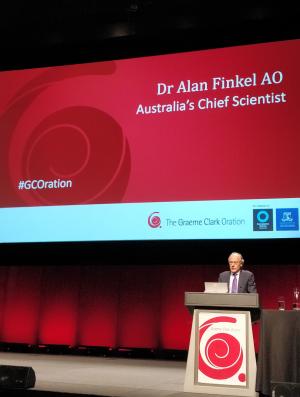Calling the brain mechanic
Dr Finkel was honoured to introduce a world leader in developing brain-machine interfaces for the 2019 Graeme Clark Oration in Melbourne this week: Professor Timothy Denison, the Royal Academy of Engineering Chair in Emerging Technologies at Oxford University.
Dr Finkel introducing the 2019 Graeme Clark Oration speaker
First established in 2008, the Graeme Clark Oration invites global leaders in health and medical science to share their work with Australians in a free public event. It’s held in honour of Professor Graeme Clark, who led the pioneering research and development of the Bionic Ear – a multiple-channel Cochlear Implant in Melbourne in the 1970s.
Dr Finkel explained how his life’s work in research and industry has been focused on exploring the complexity of the human brain, and the incredible opportunities offered through understanding it better.
“(I learned that) … it wasn’t just a grey gelatinous mass sloshing around in a skull. No, the brain was a machine: the ultimate electrical circuit.“Eighty (80) billion neurons. Trillions of connecting synapses. Perhaps two or three million gigabytes in memory.
“A computer with that much processing power would draw as much energy as a suburb of houses and occupy the space of several tennis courts.
“And you can run your brain on four squares of chocolate per hour.”
Dr Finkel then outlined for the audience the concept of the Brain Machine Interface: devices, such as the Cochlear Implant, that are capable of communicating directly with the brain’s signals to treat conditions previously thought untreatable.
“Graeme Clark used the magic of electronics to restore hearing to the profoundly deaf.
“So it is fitting that our Graeme Clark Orator for 2019 is a scientist harnessing that same magic on the next frontier: the treatment of neurological disorders like epilepsy, dementia and chronic pain.
“Perhaps Professor Denison’s most remarkable contribution has been his role in developing therapies for the treatment of Parkinson’s Disease, through a technique called Deep Brain Stimulation.
“Like many neurological conditions, it is crippling, it is progressive and it is cruel. We cannot cure it, and the symptoms of many patients are resistant to drugs.
“The devices on the market today can deliver electrical pulses into the brain to interrupt the signals that cause the tremors.
Professor Denison is leading the next step: closed-loop devices that receive feedback from the brain’s neural network, process that information, and then only deliver the pulses when required.”
Professor Denison’s full Graeme Clark Oration is available to watch on the Oration website.

